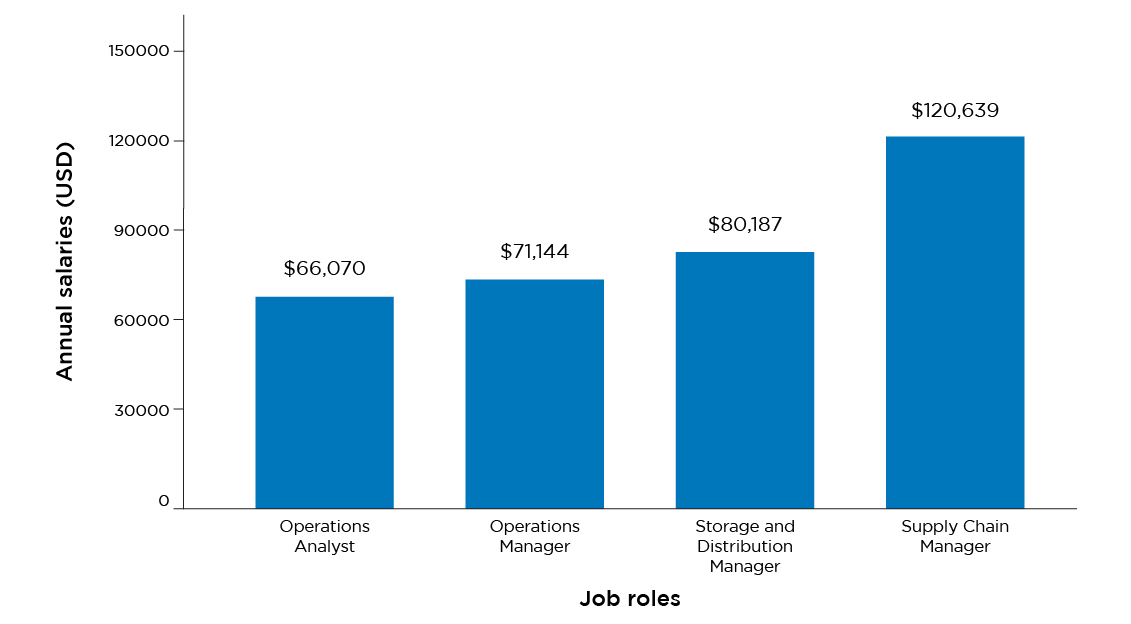The operations and supply chain management industry is a critical component of the global economy. Organizations are always on the lookout for professionals who understand the technical processes as well as the business aspects in order to grow the organization. Northwood’s Bachelor of Business Administration in Operations and Supply Chain Management will teach you how to approach operations and supply chain management with a business mindset. It will help you establish a rewarding career in the field while increasing your attractiveness to global employers.
Northwood’s Bachelor of Business Administration in Operations and Supply Chain Management program is a STEM certified program for Optional Practical Training (OPT) purposes. This means that it offers the potential for international students to work in the US for a total of 3 years and the potential for a work visa (H1-B, etc.) This makes it the perfect platform to launch your career in operations and supply chain management.
Northwood is proud to join with the Association for Supply Chain Management (ASCM), as part of ASCM’s Academic Partner Network.
GET STARTED
Please register below to receive program brochure and connect with a program advisor.

CAREER OPPORTUNITIES
As companies grow in size they increasingly focus on streamlining processes, creating an equally growing need for professionals with operations and supply chain management skills. Here is a glimpse into a career in operations and supply chain management:

“Employers love Northwood University graduates from our Operations and Supply Chain Management program because they make an immediate impact on their organization.”

THE NORTHWOOD DIFFERENCE
For over 60 years, Northwood University has prepared students to launch their careers successfully in their selected field. And our holistic approach develops the future leaders of a global free-enterprise society.
At Northwood, you will start classes in your major on your first day. This means you can validate your interest in a major field of study early and be prepared for internships after your first year. During your time at Northwood, you will;

CURRICULUM
The Bachelor of Business Administration in Operations and Supply Chain Management is designed to prepare students to excel in the fast-paced and rapidly evolving world of business operations and supply chain management. Through the program you will develop problem-solving, organizational and critical thinking skills to tackle a number of business challenges. The program will teach you to meet organizational goals while ensuring customer satisfaction.
Throughout the course of the program, you will have the opportunity to apply what you have learned in real-world settings through hands-on projects, case studies, and internships. By working with industry professionals, students will gain valuable experience and insights that will prepare them for careers in a variety of roles.
- FDN 1110 Student Success Seminar or FDN 2500 Strategies for Success — 1 credit hour
- FDN 1300 Student Leadership Seminar (campus only) — 1 credit hour
- FDN 2250 Blueprint for Success or FDN 3200 Career Advancement — 1 credit hour
General education courses are the foundation of the University’s outcomes and attributes for its graduates.
- ENG 1150 Composition I — 3 credit hours
- ENG 1200 Composition II — 3 credit hours
- MTH 1150 College Algebra or MTH 1100 Finite Math — 3 credit hours
- SPC 2050 Speech — 3 credit hours
- NSC 2100 Environmental Science or Natural Science — 3 credit hours
- HIS 2100 Foundations of the Modern World I or History Elective — 3 credit hours
- MTH 2310 Statistics I — 3 credit hours
- PSC 2010 Introduction to American Government — 3 credit hours
- 3000/4000 Psychology, Sociology or Humanities Elective — 3 credit hours
- ACC 2410 Fundamentals of Financial Accounting — 3 credit hours
- ACC 2415 Fundamentals of Managerial Accounting — 3 credit hours
- ECN 2210 Principles of Microeconomics — 3 credit hours
- ECN 2220 Principles of Macroeconomics — 3 credit hours
- LAW 3000 Business Law I — 3 credit hours
- MGT 2300 Principles of Management — 3 credit hours
- MIS 1500 Business Productivity Software — 3 credit hours
- MKT 2080 Principles of Marketing — 3 credit hours
- FIN 3010 Financial Management — 3 credit hours
- MGT 4250 Organizational Behavior — 3 credit hours
- MGT 4800 Strategic Planning — 3 credit hours
- PHL 3100 Ethics — 3 credit hours
- ECN 4010 Economics of Public Policies — 3 credit hours
- PHL 4100 Philosophy of American Enterprise — 3 credit hours
- OPS 1100 Introduction to Operations Management — 3 credit hours
- OPS 1200 Business Process Management — 3 credit hours
- MIS 3250 ERP Business Applications — 3 credit hours
- MTH 3340 Statistics II — 3 credit hours
- OPS 2350 Statistics for Quality Engineering — 3 credit hours
- OPS 3500 Purchasing — 3 credit hours
- MTH 3400 Introduction to Data Science — 3 credit hours
- OPS 3600 Supply Chain Management — 3 credit hours
- MIS 3300 Project Management — 3 credit hours
- OPS 4100 Statistics for Continuous Improvement — 3 credit hours
- OPS 4200 Lean Six Sigma — 3 credit hours
- OPS 4500 Operations & Supply Chain Management Capstone — 3 credit hours
- 3000/4000 Elective — 3 credit hours
- 3000/4000 Elective — 3 credit hours
- 3000/4000 Elective — 3 credit hours
- Choice Elective — 3 credit hours
Operations and Supply Chain Management Course Descriptions
This course deals with the strategic and operational activities that relate to the creation of goods and services through the transformation of inputs to outputs. Upon completion of this course, students will be able to formulate strategies that increase productivity and quality so as to maximize a firm’s profitability in a global marketplace and to benefit society. This course introduces other topics in the Operations and Supply Chain Management curriculum. The objective will be to provide a cohesive “big picture” so that students will be able to understand how all of the elements of Operations and Supply Chain Management tie together.
This course will examine the global competitive environment that requires organizations to view their operations in terms of business processes. Students will also learn to develop information systems to support these processes. Current, leading software will be utilized to study systems integration and development.
Prerequisite: OPS 1100 or MIS 1110
This course applies the concepts of Statistics to the quality management functions within an organization. When students have completed this course, they will be prepared to succeed on the American Society for Quality Certified Quality Engineer exam. Topics covered will include: Introduction to Quality Management, Quality Systems Requirements, Measurement Systems Analysis; Process Capability Analysis; Process Control; and Reliability and Risk Management.
Prerequisite: MTH 2310 and MTH 3340
This course will provide students with the understanding of purchasing and inventory management. Working from an ERP perspective, the course will focus on examining the day to day processes of organization, analyzing material and process flows, enhancing the value added procedures and eliminating waste, redundancy, and bureaucracy to streamline supplier selection, supplier negotiations, logistics, and procurement in a global free enterprise system. Upon completion of the Purchasing and Supply Chain Management courses, students will be prepared to write the written examination for the Certification in Production and Inventory Management (CPIM).
Prerequisites: OPS 1100, MIS 3250, and MIS 1500
This course will expose students to topics related to design and management of supply chains, from incoming raw materials to final product delivery. Course topics will include supply chain network design, facility planning, capacity planning, globalization and outsourcing, information technology, and global issues in supply chain management. Upon completion of the Purchasing and Supply Chain Management courses, students will be prepared to write the written examination for the Certification in Production and Inventory Management (CPIM).
Prerequisites: OPS 3500 and MIS 3250
The internship (a minimum of 150 hours) is designed to provide the student with supervised on-the-job training. A contract between the University, student, and employer provides the groundwork. Objectives, evaluations, written log, and a study of the organization are designed to provide a realistic learning experience.
Prerequisite: Department chair approval
This course will provide hands-on experience in the arena of Designed Experiments for process improvement and optimization. The DMAIC (Design, Measure, Analyze, Improve, Control) process will be covered in detail. Students will learn to identify sources of variation, analyze variation, reduce variation, and tie these concepts to Six Sigma methodology which can be applied in any business setting and to any business process. When the course is successfully completed, students will be prepared to be examined for Six Sigma Green Belt certification.
Prerequisite: OPS 2350
This course will provide an overview of the principles of Lean manufacturing, both internal at a company and throughout its supply chain. Topics covered will include value stream mapping and identifying waste. Students will gain experience with pull production/ just-in-time continuous flow systems. They will develop an understanding of the relationship between reducing work in process inventory and managing quality. The relationship between lean manufacturing and six sigma implementation will also be explored.
Prerequisite: OPS 2350
This course will provide the student with cumulative case study experience for the Operations and Supply Chain Management major. Students will use the knowledge gained in the previous nine classes in the Operations and Supply Chain Management program to develop operational strategies for business applications. Simulations and industry projects will be utilized in this capstone course.
Prerequisites: All OPS courses

ADMISSION
APPLICATION PROCESS
The program follows a simple 3-step application process. The step-by-step process is outlined below.
STEP 1: SUBMIT APPLICATION
Candidates can apply to the program online and attach all required materials as outlined in the requirements below.
STEP 2: ROLLING ADMISSION
The admissions team will assess your application as soon as it is received.
STEP 3: INTERVIEW
Candidates might be required to give an interview before being accepted into the program. Once all the requirements are completed, the admissions team will notify you with a decision.
For admissions support, we offer online office hours, an admissions checklist, and email and phone support to answer your questions.
APPLICATION REQUIREMENTS
Applicants for the undergraduate program are required to have:
- Passport ID page (must be valid for at least 6 months beyond the entry date to Northwood University)
- Secondary school transcripts
- Secondary school completion certificate or diploma
- College or university transcripts (if you have completed any university credits)
- English proficiency
KEY DATES
- Please Note: Application fee is refunded only in the case an applicant is not offered admission to the program.
OPTIONAL PRACTICAL TRAINING – US OPT
After you have completed at least one year of your studies in the U.S. you will be eligible to participate in the US OPT (Optional Practical Training) program for F-1 students upon the completion of your undergraduate degree, allowing you to stay in the US while you start your career in operations and supply chain management.
Optional Practical Training (OPT) is temporary employment in the US that is directly related to an F-1 student’s major area of study. Eligible students can apply to receive up to 12 months of OPT employment authorization before completing their academic studies (pre-completion) and/or after completing their academic studies (post-completion). Please click here to know more about OPT.
Northwood’s Bachelor of Business Administration in Operations and Supply Chain Management program is a STEM (Science, Technology, Engineering, and Mathematics) certified program for Optional Practical Training (OPT) purposes. This allows the graduates of the program to apply for an additional 24 months of extension of OPT. Ultimately, it offers the potential for international students to work in the US for a total of 3 years and the potential for a work visa (H1-B, etc.)

TUITION & SCHOLARSHIPS
TUITION AND FEES
The following figures are fixed 2024-2025 costs for 12-17 credit hours per semester.
| Expense Description | 1st Semester (Fall) | 2nd Semester (Spring) | Total Per Year |
|---|---|---|---|
| Tuition* | 1st Semester (Fall): $16,400 | 2nd Semester (Spring): $16,400 | Total Per Year: |
| Student and Technology Fee | 1st Semester (Fall): $800 | 2nd Semester (Spring): $800 | Total Per Year: $1600 |
*The fee does not include transport expenses, health insurance, any associated visa fees etc. and accommodation. It also does not cover any other expenses that are not expressly mentioned above. Students are required to live on campus for the first two years of attendance at Northwood University.
Healthcare plan is mandatory and is available for approximately USD $1,500*/year (*Subject to change per academic year).
SCHOLARSHIPS
The aim of the scholarships is to provide outstanding candidates with an opportunity to study irrespective of their financial circumstances. The program offers significant scholarship funding to the most talented applicants.
All applicants for the Bachelor of Business Administration in Operations and Supply Chain Management program are automatically considered for Northwood University scholarships. Scholarship amounts will be noted in your letter of acceptance.

PROGRAM EXPERIENCE
With a large international presence both at our U.S. locations and abroad, the Northwood student body is very diverse. Our alumni are at ease in complex, multi-cultural business environments with a professional network around the world. Learning at Northwood takes place in more than just the classroom. With a multitude of activities to choose from, students realize significant personal and professional growth which, after graduation, will set them apart as they launch their careers.
CAMPUS LIFE

Be it academic-based organizations like the Entrepreneurship Society, Collegiate DECA or Business Professionals of America (BPA) to Greek Life to service-based organizations like Circle K, Rotaract, the Student Athletic Advisory Council or Student Government Association, Northwood University has ways for students to be engaged and involved on campus and in the local community. These experiences help students learn first-hand, how businesses and people connect through shared experiences.
PROFESSIONAL DEVELOPMENT

Northwood students graduate with a superior business education that gives them a foundation of understanding free markets, entrepreneurial endeavors, personal responsibility, and ethical behavior. And, NU students also graduate with the ability to effectively communicate their ideas, beliefs, and experiences in an effort to promote success in their own lives and in the lives of others. Through workshops and campus-life programming, students hone networking, interviewing and résumé writing skills putting them one more step ahead in a competitive job market.
EXPERIENTIAL LEARNING

One hallmark of the Northwood education is hands-on, experiential learning. Many of our academic programs enhance classroom learning with large-scale, active learning student-run projects. These events allow our students to apply what they learn in the classroom to real situations.
ENTERPRISE/ENTREPRENEURIAL ORIENTATION

Many Northwood alumni earn their livelihoods in enterprises they own in whole or in part. While we offer a program in entrepreneurship, our entire curriculum is focused on enterprise models and entrepreneurial achievements. Enterprise is a key tenet of our Mission, and we believe entrepreneurship is the essential element of our free market economy.
COMPETITIVE ADVANTAGE

While our student-athletes are competing on the athletic fields as part of the NCAA Division II Great Lakes Intercollegiate Athletic Conference (GLIAC); many of our students also compete in academic arenas. Our national champion Mock Trial team has bested teams from Harvard, Georgetown, and Stanford while our Competitive Speech team, American Marketing Association, BPA, DECA, and American Advertising Federation student chapters regularly place in regional and national competitions.

ABOUT NORTHWOOD
On March 23, 1959, two young men with an idea, a goal, and a pragmatic philosophy to encompass it all, broke away from their careers in a traditional college structure to create a new concept in education.
Their visionary idea became a reality when Dr. Arthur E. Turner and Dr. R. Gary Stauffer enrolled 100 students at Northwood Institute. They envisioned a new type of university – one where the teaching of management led the way. While the frontiers of space were revealing their mysteries, Stauffer and Turner understood all endeavors – technical, manufacturing, marketing, retail, every type of business – needed state-of-the-art, ethics-driven management.
Time has validated the success of what these two young educators called "The Northwood Idea" – incorporating the lessons of the American free-enterprise society into the college classroom.
The University grew and matured; Northwood went from being an Institute to an accredited University, the DeVos Graduate School of Management was created and then expanded; the Adult Degree Program and its program centers expanded to over 20 locations in eight states; international program centers were formed in Malaysia, People's Republic of China, Sri Lanka, and Switzerland; and significant construction like the campus Student Life Centers added value to the Northwood students' experience. New endeavors such as Aftermarket Studies, entertainment and sports management and fashion merchandising, along with a campus partnership in Montreux, Switzerland, demonstrate an enriched experience for all our students.
Northwood University educates managers and entrepreneurs – highly skilled and ethical leaders. With more than 65,000 alumni and a vibrant future ahead, The Northwood Idea is thriving.
NORTHWOOD FACTS
|
18+ |
athletic teams |
|
31% |
of Northwood graduates own some or all of their business |
|
$13m |
in scholarships available |
|
40+ |
clubs, fraternities and sororities |
|
82% |
of graduates employed full-time or accepted to graduate programs (as per our most recent graduate survey) |
18+
athletic teams
31%
of Northwood graduates own some or all of their business
$13m
in scholarships available
40+
clubs, fraternities and sororities
82%
of graduates employed full-time or accepted to graduate programs (as of our most recent graduate survey)

ACCREDITATIONS, APPROVALS, AND MEMBERSHIPS
Northwood University believes it has a responsibility to its students and the industries and communities it serves to provide the highest standard of educational excellence possible. One measure of how well an educational institution meets this responsibility is in its accreditations and approvals by outside education associations and governmental interests. Because each Northwood location is served, at least partially, by different governmental agencies and academic accrediting bodies, and because all have been in existence for varying lengths of time, the accreditations and approvals may vary from one location to another.
ALL NORTHWOOD UNIVERSITY CAMPUSES/LOCATIONS HAVE THE FOLLOWING ACCREDITATIONS AND APPROVALS:
- Northwood University is accredited by the Higher Learning Commission (www.hlcommission.org). For more information, please click here.
- Northwood University business degree programs have business specialty accreditation from the Accreditation Council for Business Schools and Programs (ACBSP), (www.acbsp.org).
- The United States Department of Homeland Security (DHS) certified school for nonimmigrant foreign students (Fvisa); Citizenship and Immigration Services (USCIS)/ Immigration and Customs Enforcement (ICE); and Student and Exchange Visitor Program (SEVP) as a higher education institution for international students.
- Respective state offices for Veterans Administration programs as a higher education institution for degree-seeking qualified veterans and dependents.
- The U.S. Bureau of Internal Revenue as a tax-exempt institution as provided for in Section 501 (c) (3) and other applicable parts of the Internal Revenue Code for higher education organizations.
NORTHWOOD UNIVERSITY MEMBERSHIPS ARE REPRESENTED IN SUCH EDUCATIONAL AND PROFESSIONAL ORGANIZATIONS AS:
- American Accounting Association
- American Advertising Federation
- American Association of Collegiate and Admissions Officers Registrars
- American Certified Fraud Examiners
- American College Health Association
- American College Personnel Association
- American Hotel and Lodging Association
- American Institute of Certified Public Accountants
- American Library Association
- American Management Association
- American Marketing Association
- American Marketing League Association
- American Payroll Association
- American Taxation Association
- Association for Communications Technology Professionals in Higher Education
- Association for Higher Education and Disability
- Association for Leadership Educators
- Association for the Tutoring Profession
- Association of College and Research Libraries
- Association of College and University Housing Officers International
- Association of College and University Telecommunications Administrators
- Association of Professional Researchers for Advancement
- Association of University Programs in Health Administration
- Association of Veterans Educators Certifying Officials
- Automotive Aftermarket Industry Association
- College and University Personnel Association for Human Resources
- Council for the Advancement of Experiential Learning
- Council for Higher Education Accreditation
- Council for Hotel and Restaurant and Institutional Education
- Data Processing Management Association
- Educause
- Family Enterprise Research Scholars
- Family Firm Institute
- Global Consortium of Entrepreneurship Centers
- Intercollegiate Press Association
- International Assembly for Collegiate Business Education
- International Council on Hotel, Restaurant & Institutional Education
- International Leadership Association
- Mathematical Association of America
- Motor and Equipment Manufacturing Association
- National Academic Advising Association
- National Advertising Federation
- National Association for Campus Activities
- National Association for College Admission Counseling
- National Association for Developmental Education
- National Association of College Admissions Counselors
- National Association of College Auxiliary Services
- National Association of College Stores (through its bookstore provider)
- National Association of College and University Business Officers
- National Association of Colleges and Employers
- National Association of Educational Buyers
- National Association of Independent Colleges and Universities
- National Association of Intercollegiate Athletics
- National Association of International Educators
- National Association of Graduate Admissions Professionals
- National Association of College and University Mail Services
- National Association of Student Financial Aid Administrators
- National Association of Student Personnel Administrators
- National Association of Veterans Programs Administrators
- National Automobile Dealers Association
- National Collegiate Athletic Association
- National Collegiate Honors Council
- National College Learning Center Association
- National Cooperative Education Association
- National Council of Teachers of English
- National Council of Teachers of Mathematics
- National Council of Women of the United States
- National Association of Educational Buyers
- National Association of Independent Colleges and Universities
- National Association of Intercollegiate Athletics
- National Association of International Educators
- National Home Fashions League
- National Restaurant Association
- Newspaper Association of America
- Organization of American Historians
- Photographers’ Association of America
- Society for College and University Planning
- Society for Human Resources
- Specialty Equipment Market Association
- The Fashion Group
- University Risk Management and Insurance Association


